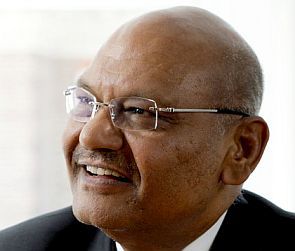On his part, Anil Agarwal has announced huge expansion plans for his aluminium business in Odisha; but unless the bauxite issue is resolved, it is not certain how he will be able to take them forward.
 A few days back, there was a newspaper advertisement from the Anil Agarwal Foundation seeking to appoint its vice-chairman and chief executive officer.
A few days back, there was a newspaper advertisement from the Anil Agarwal Foundation seeking to appoint its vice-chairman and chief executive officer.
The advertisement called the foundation a "high-impact philanthropic initiative from the founding family of Vedanta (Resources)".
On the same day, another newspaper said that the Central Bureau of Investigation, or CBI, has sought the advice of Attorney General Mukul Rohatgi on whether to probe the sale of a 26 per cent stake in state-owned Hindustan Zinc to Mr Agarwal's Sterlite Industries in 2002 for Rs 445 crore (Rs 4.45 billion).
The allegation is that the sale was undervalued, but the CBI is wary of reopening a 12-year-old case and has, therefore, sought Mr Rohatgi's opinion on the matter, the report said.
The irony was hard to ignore. Mr Agarwal had in September announced that he will give away 75 per cent of his wealth, or $3.5 billion, to charity.
Agarwal said he took the decision after a meeting with Bill Gates, the world's second-richest man who has committed a large part of his estate to the Bill & Melinda Gates Foundation.
Mr Agarwal has, thus, joined the illustrious list of billionaires who have pledged to give their wealth to charity: Warren Buffett, Larry Ellison, Azim Premji et al. Much of Mr Agarwal's commitment to charity will be spent in India.
The advertisement put out by the foundation said it will "work alongside governments and multilateral agencies" initially amongst people at the bottom of the pyramid in India and then extend it to parts of Africa.
The areas it wants to work in are: poverty alleviation, healthcare, education, and women and child development.
These programmes, the advertisement said, "will dovetail with the broad vision which the government of India is articulating in terms of social development, particularly in the areas of nutrition, health and sanitation".
What makes it noteworthy is that for quite some time now, Mr Agarwal has found himself up against stiff challenges in the country.
Many other businessmen have exited India after facing lesser adversity.
Mr Agarwal's iron ore business was hit after the Supreme Court banned mining in Karnataka and Goa over allegations of impropriety in the allotment of mines.
Mining has restarted in the two states but the volumes are low. Cairn India has been under fire from shareholders and activists for extending a loan of $1.25 billion to a subsidiary of Sesa Sterlite.
The company defended the loan on the grounds that (a) since it was extended at 300 basis points above the London inter-bank offered rate, it was a sound investment; and (b) it wasn't a material transaction as it did not exceed five per cent of the company's annual turnover and 20 per cent of its net worth, and hence did not require the consent of the shareholders.
Hindustan Zinc could become another headache. But the biggest challenge Mr Agarwal faces is in his aluminium business in Odisha.
After the Union ministry of environment and forests withdrew clearances to the Niyamgiri bauxite mines, thanks to protests by tribes and green activists, his one-million-tonne-a-year alumina refinery at Lanjigarh and 500,000-tonne-a-year aluminium smelter at Jharsuguda are functioning at 25 per cent capacity.
He has been left with no choice but to source bauxite from other states and also import some quantities, which has increased his costs.
After being thrown out of Niyamgiri, Mr Agarwal had applied to the Odisha government for 26 bauxite mines. There is no progress on that.
In the interim, the state government has allotted three laterite (rocks with low bauxite content) mines in the Koraput district, but these are small deposits that can at best meet the requirement of the Lanjigarh refinery for one year.
Mr Agarwal had, in addition, bought Dubal's stake in a venture with Larsen & Toubro, which holds the prospecting licence for large bauxite deposits in Odisha.
But the state government has not yet made up its mind because the deposits were linked to an alumina refinery L&T had proposed to set up, and the government is not sure of the legal consequences of letting that bauxite feed some other refinery.
All this is happening at a time when aluminium prices in the world market are firming up.
As a businessman, Mr Agarwal is sure to know that prices will not stay high forever, especially with signals emanating that China may be cooling down after three decades of relentless growth.
On his part, Mr Agarwal has announced huge expansion plans for his aluminium business in Odisha; but unless the bauxite issue is resolved, it is not certain how he will be able to take them forward.
Not just in business, Mr Agarwal has faced roadblocks in philanthropy as well.
His proposed Vedanta University in Odisha is, for all practical purposes, a closed chapter now.
The multi-discipline university was to have 100,000 students and was to be spread over 6,800 acres near Puri.
To be modelled on the lines of Stanford University, it involved a total investment of the order of Rs 15,000 crore or Rs 150 billion.
However, it got involved in legal tangles over land acquisition and is unlikely to be revived anytime soon.
But the idea of a world-class university is still cherished by Mr Agarwal.
While announcing his philanthropic thrust in London last month he said: "I am keen to invest and create a world-class, not-for-profit university in India that has best-in-class education in liberal arts and humanities." Whatever else, Mr Agarwal deserves full marks for perseverance.












 © 2025
© 2025